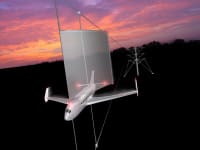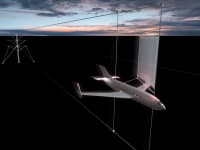Trans Wind Energy Generation
A Fresh Concept for Renewable Energy
Trans Wind Energy Generation (TWEG), patent pending, uses energy captured by fixed wing/sails traversing elevated cables to energize potor/generators riding along suspended cables which direct energy to the power grid. Richard Harrington, President of Harrington Electronics LLC, is the innovator behind this new concept as one of his many innovative products commercialized over 45 years of developing electronic products for the sports and medical fields. The concept is equivalent to sailing along cables and comes from the genesis of combining efficient, sustainable wind energy generation with the collateral benefit of moving passenger and freight in commuter modules. Sail area is proportional with horse power so large sail/wing areas will be employed to capture and convert more wind to energy. The sail/wings will move dynamically with wind currents and will provide 3 times the energy generation of traditional wind turbine systems. Estimates of energy generation place each commuter capable of producing greater than 22 Kilowatts and traveling 4 -5 time wind speed. When comparing this to average home power consumption of approximately 1 Kw, there is a significant opportunity to contribute to the world’s sustainable “GREEN” energy needs.
Imagine a world where flying 20 stories above the landscape during your work commute or your vacation is common place. TWEG will make this possible while generating energy for local and national power grids as well as adding needed jobs and revenue serving as a transport system. The TWEG harvests energy from wind currents the same way that stationary wind turbine systems do with the added benefit of traveling with the wind similar to a sail boat but more efficiently. For millennia it was common to travel or ship freight by sail ship prior to the development of the engine. Taking from this practical and once common mode of energy harvesting and combining it with new technologies provides opportunities to satisfy our growing land transportation, and electricity needs while compensating for dwindling fossil fuel reserves.
The TWEG commuter is a winged transportation system that’s suspended on cables from 200 foot towers. These cables support multiple cable sailing vessels traversing and tacking to maximize wind currents for propulsion and energy harvesting. Motor/Generators attached above and below the TWEG commuter, ride these cables and stabilize the commuter car. Energy harvested by the TWEG is used to energize the power grid and supply a backup battery to energize the motor to propel the commuter if needed. The implementation and deployment of such a system will have similar challenges when relating cost and consistency of prevailing winds as traditional wind turbine systems do. Multiple depots will be required to serve passengers and cargo as they reach their arrival and departure destinations. These depots would include the same amenities that modern airports have including rest rooms, restaurants and shops, catering to travelers. Urban TWEG systems could also be deployed into existing buildings infrastructures to transport passengers between building locations providing the same wind energy harvesting opportunities.
Like this entry?
-
About the Entrant
- Name:Rick Harrington
- Type of entry:teamTeam members:Rick Harrington
Mike Leydet
Frank Synowicz - Software used for this entry:ACAD, EXCEL, MAYA, WORD
- Patent status:pending








